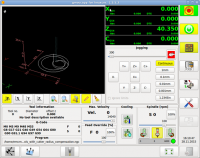QtVCP documentation to set up an development environment
- newbynobi
-
 Topic Author
Topic Author
- Offline
- Platinum Member
-

Less
More
- Posts: 1931
- Thank you received: 394
03 Dec 2018 21:20 - 03 Dec 2018 21:21 #121768
by newbynobi
QtVCP documentation to set up an development environment was created by newbynobi
Hallo,
i would like t contribute to QtVCP, but I was not able to find documentation about setting up an development system.
Did i just search the wrong way, or is there no documentation?
Next question, will you go on with the old python 2 or will the system support also python 3?
Norbert
i would like t contribute to QtVCP, but I was not able to find documentation about setting up an development system.
Did i just search the wrong way, or is there no documentation?
Next question, will you go on with the old python 2 or will the system support also python 3?
Norbert
Last edit: 03 Dec 2018 21:21 by newbynobi.
The following user(s) said Thank You: KCJ
Please Log in or Create an account to join the conversation.
- cmorley
- Offline
- Moderator
-

Less
More
- Posts: 7291
- Thank you received: 2128
04 Dec 2018 08:38 #121801
by cmorley
Replied by cmorley on topic QtVCP documentation to set up an development environment
Hello Norbert!
I am happy you are interested in the project - I hope we can work well together again!
I assume you mean setting up designer.
using qt5vcp_py2 look in /lib/qtvcp/designer/README.txt
If you mean documentation for qtvcp - there are some HTML documents in the usual place.
Qtvcp will continue to use python2 as there is no python3 libraries in linuxcnc.
I did cobble together a branch with a proof of concept python3 HAL library.
We would need a python3 library for linuxcnc.
With those two libraries, then QtVCP could be converted to python3.
BUT, I don't think it is wise to require users to use two types of python to use linuxcnc. We need to convert the whole project -BIG job. I seriously don't think we have enough active developers to do this in a reasonable amount of time.
Chris M
I am happy you are interested in the project - I hope we can work well together again!
I assume you mean setting up designer.
using qt5vcp_py2 look in /lib/qtvcp/designer/README.txt
If you mean documentation for qtvcp - there are some HTML documents in the usual place.
Qtvcp will continue to use python2 as there is no python3 libraries in linuxcnc.
I did cobble together a branch with a proof of concept python3 HAL library.
We would need a python3 library for linuxcnc.
With those two libraries, then QtVCP could be converted to python3.
BUT, I don't think it is wise to require users to use two types of python to use linuxcnc. We need to convert the whole project -BIG job. I seriously don't think we have enough active developers to do this in a reasonable amount of time.
Chris M
Please Log in or Create an account to join the conversation.
- andypugh
-

- Offline
- Moderator
-

Less
More
- Posts: 19802
- Thank you received: 4609
06 Dec 2018 17:27 #121966
by andypugh
Have you experimented with running 2to3 to see how it gets on? docs.python.org/2/library/2to3.html
Replied by andypugh on topic QtVCP documentation to set up an development environment
BUT, I don't think it is wise to require users to use two types of python to use linuxcnc. We need to convert the whole project -BIG job. I seriously don't think we have enough active developers to do this in a reasonable amount of time
Have you experimented with running 2to3 to see how it gets on? docs.python.org/2/library/2to3.html
Please Log in or Create an account to join the conversation.
- cmorley
- Offline
- Moderator
-

Less
More
- Posts: 7291
- Thank you received: 2128
06 Dec 2018 17:32 #121969
by cmorley
Replied by cmorley on topic QtVCP documentation to set up an development environment
Andy:
I have once converted qtvcp to python3 along time ago using this library.
It work pretty good IIRC.
But it does not work on C/C++ extensions - that is the big job part.
Chris M
I have once converted qtvcp to python3 along time ago using this library.
It work pretty good IIRC.
But it does not work on C/C++ extensions - that is the big job part.
Chris M
Please Log in or Create an account to join the conversation.
- cmorley
- Offline
- Moderator
-

Less
More
- Posts: 7291
- Thank you received: 2128
06 Dec 2018 17:35 #121970
by cmorley
Replied by cmorley on topic QtVCP documentation to set up an development environment
I should clarify - I converted (an older) qtvcp to python3 right up until I realized it wouldn't work with out the C/C++ extension libraries.
Chris M
Chris M
Please Log in or Create an account to join the conversation.
Time to create page: 0.064 seconds
